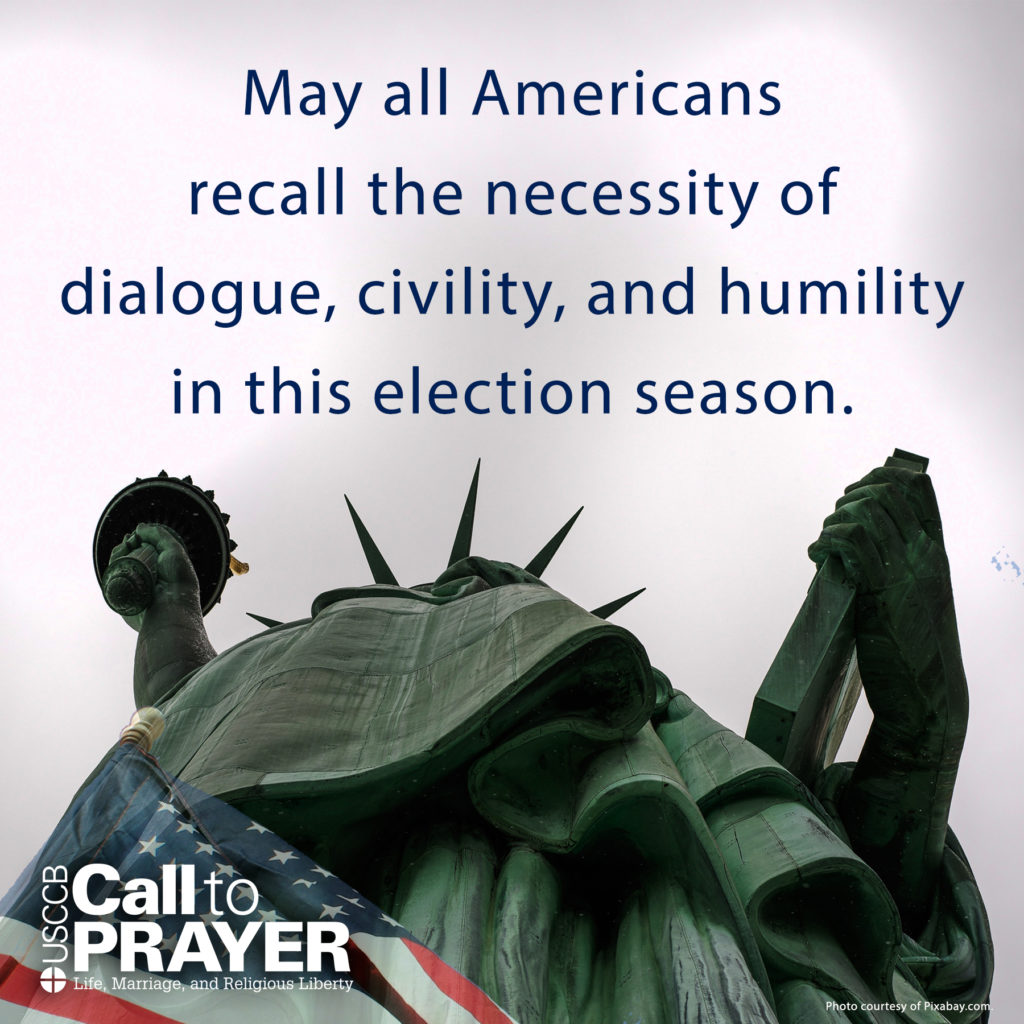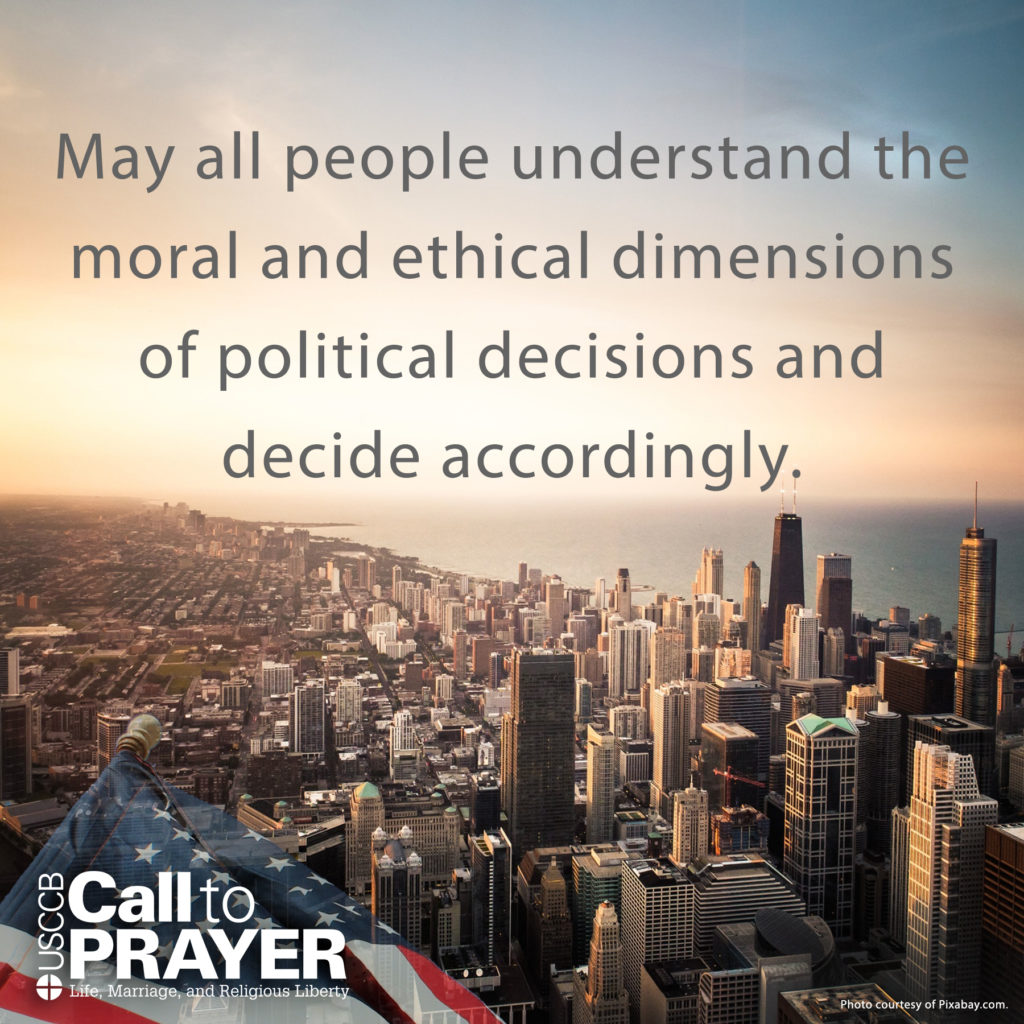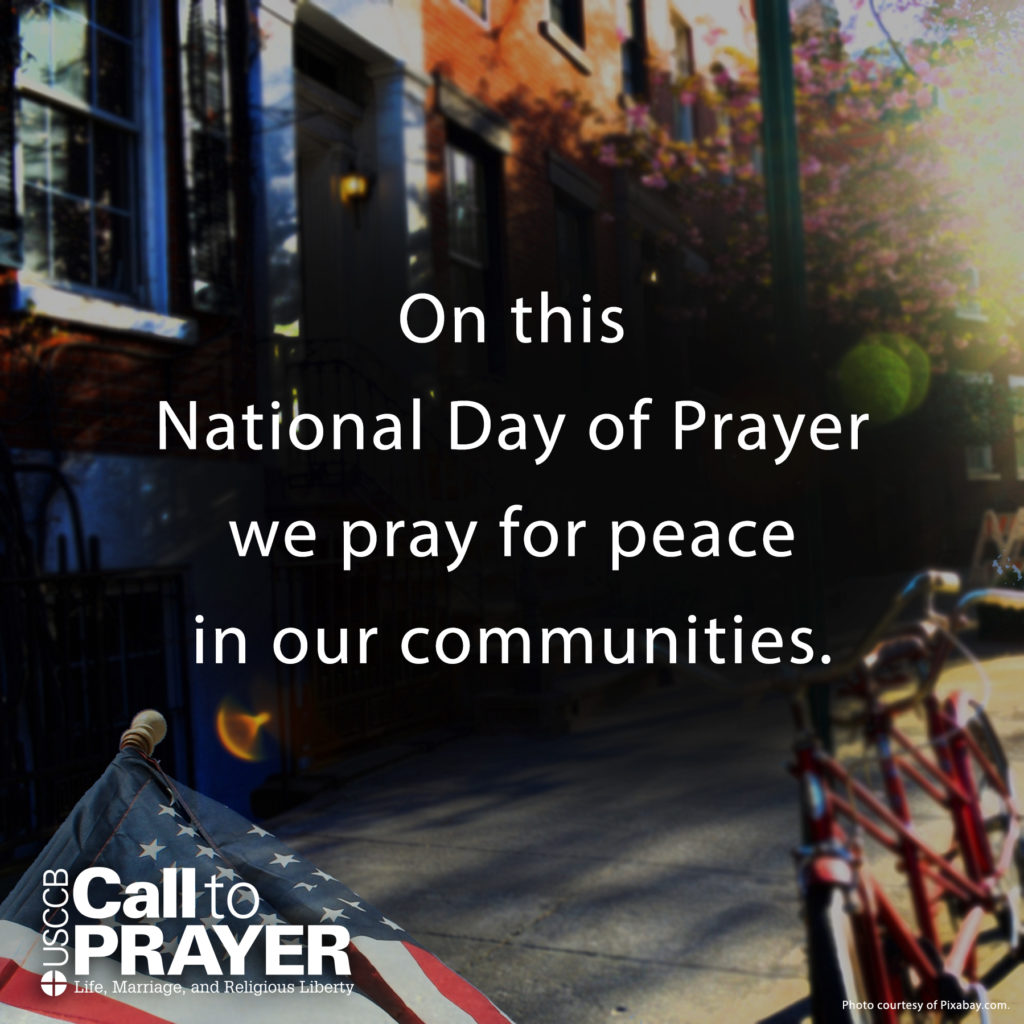Call to Prayer: September 30, 2016
Archive
Archbishop Chaput 2016 Tocqueville Lecture
Archbishop Chaput, Chairman-Elect for the Committee on Laity, Marriage, Family Life and Youth at the USCCB, gave the Tocqueville Lecture at the University of Notre Dame on September 15th, 2016. The full text is available here. The middle section, reprinted here, examines the importance of a true understanding of human sexuality:
So, what does any of this have to do with sex, family and the liberty of the Church? I’ll answer the question this way.
I’ve been a priest for 46 years. During that time I’ve heard something more than 12,000 personal confessions and done hundreds of spiritual direction sessions. That’s a lot of listening. When you spend several thousand hours of your life, as most priests do, hearing the failures and hurts in people’s lives – men who beat their wives; women who cheat on their husbands; the addicts to porn or alcohol or drugs; the thieves, the hopeless, the self-satisfied and the self-hating – you get a pretty good picture of the world as it really is, and its effect on the human soul. The confessional is more real than any reality show because nobody’s watching. It’s just you, God and the penitents, and the suffering they bring with them.
As a priest, what’s most striking to me about the last five decades is the huge spike in people – both men and women — confessing promiscuity, infidelity, sexual violence and sexual confusion as an ordinary part of life, and the massive role of pornography in wrecking marriages, families and even the vocations of clergy and religious.
In a sense, this shouldn’t surprise. Sex is powerful. Sex is attractive. Sex is a basic appetite and instinct. Our sexuality is tied intimately to who we are; how we search for love and happiness; how we defeat the pervasive loneliness in life; and, for most people, how we claim some little bit of permanence in the world and its story by having children. The reason Pope Francis so forcefully rejects “gender theory” is not just because it lacks scientific support — though it certainly has that problem. Gender theory is a kind of metaphysics that subverts the very nature of sexuality by denying the male-female complementarity encoded into our bodies. In doing that, it attacks a basic building block of human identity and meaning — and by extension, the foundation of human social organization.
But let’s get back to the confessional. Listening to people’s sexual sins in the Sacrament of Penance is hardly new news. But the scope, the novelty, the violence and the compulsiveness of the sins are. And remember that people only come to Confession when they already have some sense of right and wrong; when they already understand, at least dimly, that they need to change their lives and seek God’s mercy.
That word “mercy” is worth examining. Mercy is one of the defining and most beautiful qualities of God. Pope Francis rightly calls us to incarnate it in our own lives this year. Unfortunately, it’s also a word we can easily misuse to avoid the hard work of moral reasoning and judgment. Mercy means nothing – it’s just an exercise in sentimentality – without clarity about moral truth.
We can’t show mercy to someone who owes us nothing; someone who’s done nothing wrong. Mercy implies a pre-existing act of injustice that must be corrected. And satisfying justice requires a framework of higher truth about human meaning and behavior. It requires an understanding of truth that establishes some things as good and others as evil; some things as life-giving and others that are destructive.
Here’s why that’s important. The truth about our sexuality is that infidelity, promiscuity, sexual confusion and mass pornography create human wreckage. Multiply that wreckage by tens of millions of persons over five decades. Then compound it with media nonsense about the innocence of casual sex and the “happy” children of friendly divorces. What you get is what we have now: a dysfunctional culture of frustrated and wounded people increasingly incapable of permanent commitments, self-sacrifice and sustained intimacy, and unwilling to face the reality of their own problems.
This has political consequences. People unwilling to rule their appetites will inevitably be ruled by them — and eventually, they’ll be ruled by someone else. People too weak to sustain faithful relationships are also too weak to be free. Sooner or later they surrender themselves to a state that compensates for their narcissism and immaturity with its own forms of social control.
People too worried or self-focused to welcome new life, to bear and raise children in a loving family, and to form them in virtue and moral character, are writing themselves out of the human story. They’re extinguishing their own future. This is what makes the resistance of so many millennials to having children so troubling.[1]
The future belongs to people who believe in something beyond themselves, and who live and sacrifice accordingly. It belongs to people who think and hope inter-generationally. If you want a portrait of what I mean, consider this: The most common name given to newborn male babies in London for the past four years in a row is Muhammad. This, in the city of Thomas More.
Weak and selfish individuals make weak and selfish marriages. Weak and selfish marriages make broken families. And broken families continue and spread the cycle of dysfunction. They do it by creating more and more wounded individuals. A vast amount of social data shows that children from broken families are much more likely to live in poverty, to be poorly educated, and to have more emotional and physical health issues than children from intact families. In other words, when healthy marriages and families decline, the social costs rise.
The family is where children discover how to be human. It’s where they learn how to respect and love other people; where they see their parents sacrificing for the common good of the household; and where they discover their place in a family story larger than themselves. Raising children is beautiful but also hard work. It’s a task for unselfish, devoted parents. And parents need the friendship and support of other likeminded parents. It takes parents to raise a child, not a legion of professional experts, as helpful as they can sometimes be.
Only a mother and father can provide the intimacy of maternal and paternal love. Many single parents do a heroic job of raising good children, and they deserve our admiration and praise. But only a mother and father can offer the unique kind of human love rooted in flesh and blood; the kind that comes from mutual submission and self-giving; the kind that comes from the complementarity of sexual difference.
No parents do this perfectly. Some fail badly. Too often the nature of modern American life helps and encourages them to fail. But in trying, parents pass along to the next generation an absolutely basic truth. It’s the truth that things like love, faith, trust, patience, understanding, tenderness, fidelity and courage really do matter, and they provide the foundation for a fully human life.
Of course some of the worst pressures on family life come from outside the home. They come in the form of unemployment, low pay, crime, poor housing, chronic illness and bad schools.
These are vitally important issues with real human consequences. And in Catholic thought, government has a role to play in easing such problems – but not if a government works from a crippled idea of who man is, what marriage is, and what a family is. And not if a government deliberately shapes its policies to interfere with and control the mediating institutions in civil society that already serve the public well. Yet this could arguably describe many of the current administration’s actions over the past seven years.
The counterweight to intrusive government is a populace of mature citizens who push back and defend the autonomy of their civil space. The problem with a consumer economy though – as Christopher Lasch saw nearly 40 years ago — is that it creates and relies on dependent, self-absorbed consumers. It needs and breeds what Lasch called a “culture of narcissism,” forgetful of the past, addicted to the present and disinterested in the future. And it’s hard to argue with the evidence. In his inaugural speech of 1961, John F. Kennedy could still tell Americans, quite confidently, to “ask not what your country can do for you, but what you can do for your country.” Today I wonder how many of us might find his words not only naïve and annoying, but an inversion of priorities.
If we want strong families, we need strong men and women to create and sustain them with maturity and love. And as a family of families, the Church is no different. The Church is strong when her families and individual sons and daughters are strong; when they believe what she teaches, and then witness her message with courage and zeal.
She’s weak when her people are too tepid or comfortable, too eager to “fit in” or frankly too afraid of public disapproval, to see the world as it really is. The Church is “ours” only in the sense that we belong to her as our mother and teacher in the family of God. The Church does not belong to us. We belong to her. And the Church in turn belongs to Jesus Christ who guarantees her freedom whether Caesar likes it or not.
The Church is free even in the worst persecution. She’s free even when many of her children desert her. She’s free because God does exist, and the Church depends not on numbers or resources but on her fidelity to God’s Word. But her practical liberty — her credibility and effectiveness, here and now, in our wider society — depends on us. So we should turn to that issue in the time remaining.
Archive
Call to Prayer: September 23, 2016
Archive
Call to Prayer: September 16, 2016
Archive
Bishop DiLorenzo on Marriage

Statement posted September 13, 2016
More than a year after the U.S. Supreme Court’s ruling on marriage, and despite recent statements from the campaign trail, the Catholic Church’s 2000-year-old teaching to the truth about what constitutes marriage remains unchanged and resolute.
As Catholics, we believe, all humans warrant dignity and deserve love and respect, and unjust discrimination is always wrong. Our understanding of marriage, however, is a matter of justice and fidelity to our Creator’s original design. Marriage is the only institution uniting one man and one woman with each other and with any child who comes from their union. Redefining marriage furthers no one’s rights, least of all those of children, who should not purposely be deprived of the right to be nurtured and loved by a mother and a father.
We call on Catholics and all those concerned for preserving this sacred union to unite in prayer, to live and speak out with compassion and charity about the true nature of marriage – the heart of family life.
Archive
Archbishop Cordileone on Amoris Laetitia
From September 15, 2016 issue of Catholic San Francisco.
This is the first in a series of six articles by Archbishop Cordileone on Pope Francis’ apostolic exhortation “Amoris Laetitia” (the Joy of Love).
“The Christian proclamation on the family is good news indeed.” These words are among the opening statements of Pope Francis’ Apostolic Exhortation Amoris Laetitia (the Joy of Love). An Apostolic Exhortation is the document issued by the Pope following on a Synod of Bishops which recapitulates and gives direction to the deliberations of the participating bishops, a sort of universal pastoral plan for the specific topic treated at the Synod affecting the life and ministry of the Church. Amoris Laeititia, the longest such document yet, follows up on the Synods on the Family of 2014 and 2015.
The Christian understanding of the family, marriage, and the human person are indeed good news. It stands in stark contrast to the view held by many today, according to which we are fundamentally alone in life (Mother Theresa has said that, particularly in the West, “loneliness… is the greatest poverty”), and that society is held together largely by a collection of individual rights. As Christians, however, we believe that every human person is, in the words of Saint John Paul II, “unique and unrepeatable,” and that each of us is created “in the image and likeness of God” (Gen 1:17).
What does it mean to be in the image and likeness of God? We know from Scripture that God is Love (1 John 4:8), and love always means making a gift of oneself for the good of the other. We also know from Revelation that God is not alone – God is a Trinity of Persons. On reflection, this makes sense, because to have love, to “be love,” requires more than one person. The Father loves the Son, everything He is and has He gives to the Son; the Son in turn loves the Father and returns this to the Father; and, because love is always other-centered and life-giving, the love between them generates the Holy Spirit, the “Lord and giver of life,” who “proceeds from the Father and the Son,” as we profess every Sunday at Mass.
Thus, the most fundamental and true statement to be made about any person is that we are made for love (with others on earth, and with God – Love Himself – in heaven). The Second Vatican Council teaches us that the human person “cannot fully find himself, except through a sincere gift of himself” (Pastoral Constitution on the Church in the Modern World, Gaudium et Spes, n. 24), that is, except through loving others.
Further, to love and to be loved is not only essential to our human nature, but it is the very end for which we are designed, that is, to live in union with others. In contrast to Enlightenment philosophers such as Hobbes, Locke and Rousseau, who claim that human nature is essentially solitary, the Christian understanding – and one of the basic principles of Catholic Social Teaching – is that we are social beings. (We can recognize, for example, that the most severe punishment in prison is solitary confinement, as this is the denial of our basic human need for others – thus the movement to mollify this extreme penalty.) We are made in the image of God, who Himself is a “communion of persons,” according to Pope Francis.
All of Catholic teaching on marriage and family, all of Catholic Social Teaching, is based on this understanding of the human person. We can only truly flourish as a person in relation to others. Even our salvation depends on this – we are saved not so much as individuals, but in being joined to the Body of Christ (cf 1 Cor 12:27).
The Holy Father urges a “patient and careful reading” of the text by families and those in ministry to families. I hope in this upcoming series of brief articles to offer some useful reflections on Amoris Laetitia, and apply it to current issues around marriage, family life and sexuality. In the end, however, I must echo the words of Pope Francis, by strongly encouraging couples to read the document themselves slowly and prayerfully. At the very least, I ask all couples to please read excerpts from Chapter 4 (“Love in Marriage”), already published in the April 14, 2016, issue of Catholic San Francisco.



